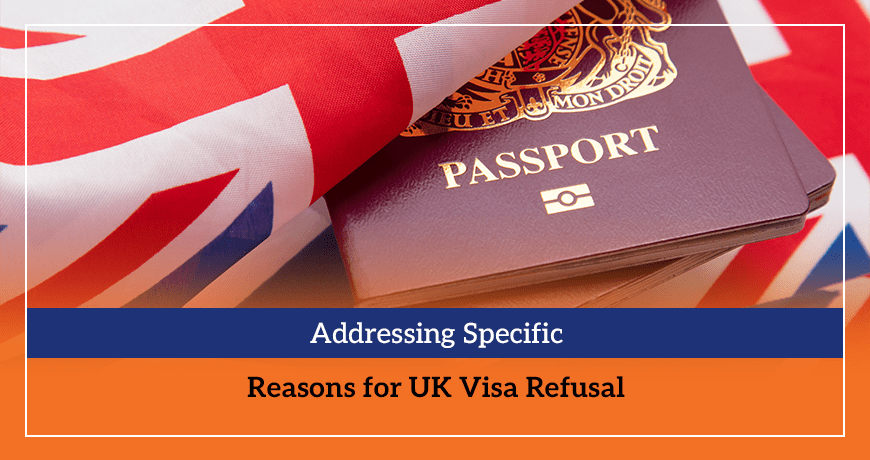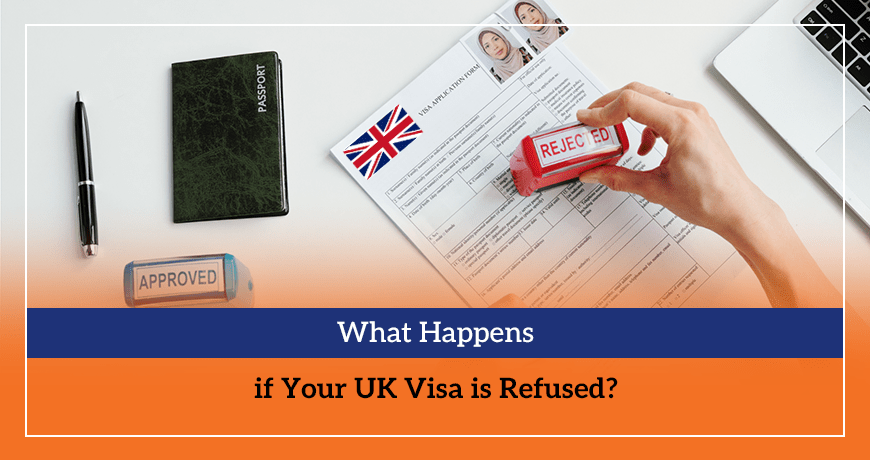Have you had a UK visa refused and started wondering if the next application is already lost? For many applicants, the chances of getting a UK visa after refusal improve a lot once the refusal letter is understood and the same weak points are not repeated. UK Visas and Immigration (UKVI), the Home Office, your refusal notice, and your supporting documents all connect to one simple question: what was the decision-maker not satisfied about?
A refusal feels personal, yet a visa decision is usually about evidence, credibility, and whether the route fits your plans. If you are searching “how soon can I reapply after a UK visa refusal?”, this guide gives a clear path through reapplying, administrative review, and appeal rights, with practical steps for visitor, student, work, and family routes. You will see common refusal reasons, how to respond to them in writing, and how to avoid the mistakes that trigger repeat refusals.
What are your chances of getting a UK visa after refusal?
There is no official approval percentage for “second-time” UK visa applications. UKVI publishes grant data for routes and time periods, yet it does not publish a standard success rate for reapplications after refusal. A refusal outcome links to your visa route, your refusal reasons, your evidence set, and how well the next application answers the same concerns.
For recent context, recent UK student visa trend data and Home Office immigration statistics show the UK grants visas in large numbers across routes. Visitor visa grants were around 2.2 million in the latest published year ending September 2025. Sponsored study visa grants were around 440,000 in the same period. Those figures do not measure reapplication success, yet they show that approvals remain common when the rules and evidence line up.
In practice, your personal chances rise when:
- the visa route matches your real purpose
- the refusal reasons are answered point by point
- finances are clear, stable, and well evidenced
- your explanation reads as consistent and believable across forms, documents, and interviews
- previous refusals are declared honestly with a short, clear explanation
- the next step is chosen correctly, rather than reacting fast
A second application can be stronger than the first. It needs real changes in evidence, clarity, or circumstances, not just more paperwork.

Addressing Specific Reasons for UK Visa Refusal
Common reasons for UK visa refusal
Most refusals fall into repeat patterns. Knowing the pattern helps you fix the right thing before spending time and fees on a new attempt.
1. Financial and bank statement problems
A large share of refusals happen when the decision-maker is not satisfied you can fund the trip, course, or stay under the route rules. Common triggers include:
- the balance looks too low for the stated plan
- deposits appear close to the application date with no explanation
- statements are missing pages, dates, or key details
- income evidence does not match bank activity
- sponsor support is unclear, or the relationship is not well evidenced
A stronger second application shows a stable financial picture. It uses complete statements for the required period, clear income proof, and simple explanations backed by documents, including an acceptable bank statement format that meets UKVI expectations.
2. Credibility concerns and weak explanations
UKVI caseworkers look for a coherent story. Credibility concerns can arise when:
- travel plans or study plans are vague
- your forms and documents do not match
- your answers in an interview do not match your documents
- your past travel history raises questions about returning home
- your course choice does not fit your academic or work background
A stronger reapplication keeps one clear narrative across the form, your supporting documents, and any statement you provide. It avoids contradictions on dates, addresses, job titles, study history, and funding.
3. English language or academic requirements not met
Student and work routes can be refused when:
- the English test level is wrong for the route
- the test is not accepted for the route
- academic documents do not match the course entry level
- your course choice looks like a weak progression from your past study or work
A stronger application checks route requirements carefully, including accepted SELT requirements, then shows how your course choice fits your profile and your future plan.
4. Innocent mistakes and incomplete applications
Small errors can trigger refusal, even when your case is strong. Examples include:
- inconsistent personal details across documents
- missing pages in statements or passports
- low-quality scans that hide key information
- missing uploads or mandatory documents
A careful second attempt focuses on accuracy and consistency across every item you submit.
5. Criminality and previous immigration breaches
UKVI considers criminal records, overstays, and serious breaches. A refusal on these grounds can be harder to overcome. The right next step can involve route choices, timing, and regulated advice, based on the refusal letter wording and the facts of the case.
6. Wrong visa route for your real purpose
This is common when applicants follow poor advice. If your planned activity does not match the visa route, a refusal can follow even if you provided many documents. A stronger application starts with route fit, then builds evidence that matches that route.

What Happens if Your UK Visa is Refused
Does a UK visa refusal affect future applications?
Yes. A refusal can lead to more scrutiny on future UK applications, and it can matter for other countries too. The practical impact comes from consistency and honesty.
How refusals are recorded
Refusals are recorded in Home Office systems and linked to your passport details and biometrics. A future caseworker can see the refusal history and the reasons. This makes consistency and full disclosure more serious on later applications.
Why you must always declare previous refusals
UK visa forms ask about refusals. A truthful answer protects you from a bigger problem later. Hiding a refusal can be treated as deception, and that can damage future applications far more than the refusal itself.
A previous refusal often leads to:
- closer review of your evidence
- extra focus on credibility and consistency
- extra attention on what changed since last time
A past refusal does not end your chances. It changes the level of scrutiny.
How to understand your UK visa refusal letter
Your refusal letter is your checklist for the next step. Read it slowly and convert it into actions.
Use this method:
- Read the full letter once, without reacting.
- Mark each reason the officer gave.
- Rewrite each reason in plain language.
- Match each reason to what you submitted.
- Decide what kind of problem it was:
- missing evidence
- weak evidence
- inconsistency
- route mismatch
- a genuine eligibility issue in your circumstances
- Keep a scanned copy for your records.
If a refusal reason is unclear, a short review with a regulated adviser can stop you from misreading the decision basis.
Reapplying after a UK visa refusal
There is often no mandatory waiting period before reapplying. The bigger risk is reapplying with the same evidence and the same explanations. Repeat refusals can create a pattern that is harder to explain over time.
When reapplication makes sense
Reapplying often suits cases where:
- documents were missing or unclear
- finances can now be shown more clearly
- your circumstances changed in a meaningful way
- your route choice is now correct
- you have no appeal right for the route
When you should pause and rethink
A refusal may also connect to route strategy and household plans, so it helps to check the latest UK dependant visa changes before you decide your next move.
A fast reapplication can backfire when:
- your finances still do not meet the route requirement
- your story still has gaps or contradictions
- the refusal included credibility concerns you have not addressed
- the refusal suggests deception or serious suitability issues
- you do not understand the refusal letter reasoning
A short delay used to strengthen the case can raise your chances more than speed.
Step-by-step reapplication checklist
Before you submit a new application, work through this checklist:
- Address every refusal reason in writing: Create a short cover letter that lists each refusal point and answers it with evidence.
- Strengthen your financial evidence: Use complete statements for the required period. Explain deposits with documents. Add income proof that matches bank activity.
- Fix gaps in your documentation: Add missing items and improve weak ones, such as employer letters, sponsor letters, proof of relationship to a sponsor, tenancy or property records, and travel details.
- Clarify your travel or study plans: Provide a clear itinerary for visits or a clear study plan for student cases. Keep the plan realistic and supported by documents.
- Check all forms and answers for consistency: Dates, addresses, job titles, salaries, and travel history must match across the form and every document.
- Consider a regulated review: A short review can spot contradictions and weak points that are easy to miss when you feel stressed.
Chances of getting a UK student visa after refusal
Student visa refusals often come down to funding compliance, credibility, and course fit, including how you explain breaks in study under study gap rules for UK admissions. A refusal can be turned around when the second application answers the exact concern that triggered the decision.
Recent Home Office statistics show sponsored study visas are granted in large numbers across the year ending September 2025. That does not guarantee any single case, yet it supports a realistic point: student approvals remain common when the rules and evidence are met.
Key steps to improve a refused student visa application
Analyse the refusal reasons in depth
Look past broad wording like “not satisfied you are a genuine student.” Identify the real issue. It may be funding, course progression, interview answers, or inconsistencies.
Strengthen your financial evidence
Use compliant statements for the required period. Add scholarship letters or sponsor documents where relevant. Keep your funding story simple, traceable, and backed by documents.
Explain your academic and career plan clearly
Your course choice should make sense with your past study or work. Your statement should explain why the course fits your plan after study.
Demonstrate ties to your home country
Student route decisions can involve credibility. Evidence of family responsibilities, property, work plans, or long-term commitments at home can support your return intention.
Prepare for credibility interviews
Practice your explanation for course choice, institution choice, funding source, and your plan after study using typical study-abroad interview questions. Answers must match your documents.
A well-prepared second student application often reads clearer than the first. It shows consistency across the form, supporting documents, and your explanation.

Appealing Against the UK Visa Refusal
Appealing against a UK visa refusal
Not every visa refusal carries a right of appeal. Many entry clearance refusals, such as visitor visas, do not offer a full appeal right. Some routes offer administrative review. Some family and human rights related decisions may offer appeal rights.
A full appeal, when available, is heard by the First-tier Tribunal (Immigration and Asylum Chamber).
Grounds for appeal
Appeals focus on points such as:
- an error in law or process
- evidence assessed incorrectly
- a decision that engages human rights grounds in the case
- new, significant evidence in routes and procedures that allow it
Appeals are legal processes. Many applicants choose legal support, since the framing and deadlines matter a lot.
The appeal process in brief
The usual flow looks like this:
- check your right of appeal and the deadline in the refusal notice
- lodge the appeal with the fee and grounds
- prepare statements and documents as required
- receive and review the Home Office bundle
- attend a hearing or receive a paper decision, based on the route and option chosen
- receive a decision from the tribunal
Official GOV.UK guidance sets the appeal deadlines and fees. Many cases have 14 days to appeal from inside the UK, and 28 days from outside the UK, based on the decision notice and location. Fees are published for appeals with a hearing and without a hearing.
How long after an allowed appeal to get your visa?
If an appeal is allowed, Home Office steps to implement the decision can take weeks, and some cases involve further steps linked to BRP and status checks. Time can change by route, workload, and any follow-up checks. Some cases need updated biometrics or updated documents.
Administrative review, refunds, and fees after refusal
Administrative review: what it is and what it is not
Administrative review is a formal request for the Home Office to look again at an eligible decision for a caseworking error. It is not a new application. It is not a way to add new evidence.
GOV.UK guidance lists time limits and fees for administrative review in many entry clearance cases. A common time limit is 28 days from outside the UK, and the published fee is £80. GOV.UK guidance also warns that making a new immigration application can lead to the administrative review request being treated as withdrawn, so it helps to understand what withdrawal means for your case.
Will you get a refund if your UK visa is refused?
A refusal usually does not lead to a refund of the visa fee. The Home Office refunds policy explains that fees generally cover processing and checks, even when a refusal is issued. Refunds can apply in limited situations, such as certain withdrawals, yet refusal alone is not a normal refund trigger.
How to improve your chances after a UK visa refusal
Improving your chances is about answering the same concerns that caused the refusal, with clearer evidence and cleaner consistency.
1. Fix mistakes and inconsistencies
Review your old form and documents and look for:
- different dates in different places
- conflicting job titles or salary figures
- mismatched addresses
- missing pages or unclear scans
Small inconsistencies can look like credibility issues, even when the core story is true.
2. Strengthen finances and evidence of support
Strong financial evidence is clear and traceable. Helpful improvements include:
- stable balances for the required period
- income proof that matches your statements
- written explanations for deposits with supporting documents
- sponsor evidence that proves relationship, income, and ability to support
A clean financial story can remove one of the most common refusal triggers.
3. Show ties to your home country
For temporary routes, ties can support return intention. Examples include:
- stable employment and approved leave
- close family responsibilities
- long-term study plans outside the UK
- property ownership or long-term tenancy
- business commitments
Ties work best when they connect to your real life and are backed by documents.
4. Seek advice or representation when the case is complex
Regulated advisers and solicitors can help interpret the refusal letter and shape the next step. This can matter a lot when:
- there are multiple refusals
- the refusal includes credibility findings
- funding is complex
- there is any suggestion of deception or serious suitability issues
- the next step is an appeal or an administrative review
A good adviser will focus on evidence, consistency, and route fit, not generic reassurance.
Real-life example: From refusal to approval
Consider Aisha, a student applicant who wanted to study in the UK. Her first student visa application was refused after the decision-maker was not satisfied her funds met the requirement and were shown in a clear, compliant way.
Aisha took time to rebuild her case. She gathered complete statements for the full required period, kept funds in a clear account trail, added sponsor evidence with proof of relationship and income, and wrote a concise statement that matched her documents and her study plan.
Her second attempt was stronger. The evidence answered the refusal points directly, and her explanation stayed consistent across the form and supporting documents. The case shows a simple lesson: a refusal can turn into an approval when the real issue is identified and fixed with clear proof.
Reapply, appeal or seek help: choosing your next step
After refusal, most applicants face three routes: reapply, request administrative review, or appeal, and in some situations, it is worth understanding the rules around switching routes inside the UK before choosing your next step. The right choice comes from your refusal letter wording, the visa route, and the type of refusal reason.
Reapplying fits cases where documents, finances, or clarity can be improved. Administrative review suits eligible decisions where you believe a caseworking error took place. Appeals fit cases where appeal rights exist and the grounds are strong.
A refusal does not need to define your future. Your next step should be calm, evidence-led, and consistent, with full disclosure of the refusal history.

Frequently asked questions
Can I get a UK visa after refusal?
Yes. Many people get a UK visa after refusal when they answer the refusal reasons clearly and submit stronger evidence.
How soon can I reapply after a UK visa refusal?
There is often no mandatory waiting period. A new application works best once you have fixed the refusal points, not before.
Do I have to declare a previous UK visa refusal?
Yes. UK forms ask about refusals. A truthful answer supports credibility on later applications.
Is it better to appeal or reapply?
A reapplication often suits cases with weak or missing evidence. An appeal only suits routes that give appeal rights and cases with strong grounds shown in the refusal notice.
Does a refusal stamp or record in my passport stop me getting other visas?
A refusal record does not block future visas by itself. It can lead to more scrutiny. Clear disclosure and stronger evidence matter.
What if my circumstances haven’t changed since the refusal?
If nothing changed, a different outcome is less likely. Focus on improving the weak points that led to refusal, then apply again with a stronger case.
Do I need a lawyer after a UK visa refusal?
A lawyer is not required for every case. Many applicants benefit from regulated advice when the refusal is serious, repeated, or linked to appeal or review steps.
Conclusion: Turning a UK visa refusal into approval
UKVI refusal letters, Home Office decision-making, financial evidence, credibility checks, and the right next step all shape what happens after a refusal. A refusal feels like a stop sign, yet it often works as a checklist of what UKVI still needs to see.
A stronger second attempt comes from one clear approach: read the refusal letter closely, answer each refusal point directly, and remove contradictions across forms and documents. Watch for route fit, keep your financial story clear, and declare past refusals honestly.
If you want support, start with a structured review of your refusal notice and your evidence set. That single step can turn anxiety into a plan and raise your chances of getting a UK visa after refusal.